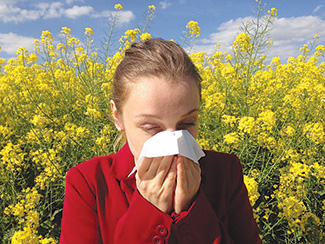Many adults are getting allergies for the first time thanks to climate change
By ERIKA EDWARDS
NBC Health
 For several years now, we are living in a world where every sneeze, each hint of a scratchy throat or stuffy nose, gives a person pause. Is it Covid? Just a cold?
For several years now, we are living in a world where every sneeze, each hint of a scratchy throat or stuffy nose, gives a person pause. Is it Covid? Just a cold?
For a growing number of adults in their 30s, 40s and 50s, those symptoms are turning out to be hallmarks of something they’ve never had to deal with before: seasonal allergies.
“What I see is people coming in for the first time, especially over the last five, seven years or so,” said Dr. Clifford Bassett, an allergist at NYU Langone Health in New York City. “They will always say, ‘I don’t understand how this is happening to me.’”
Dr. Michele Pham, an allergist and immunologist at UCSF Health in San Francisco, has noticed the same trend.
“We’ve had patients coming to us saying, ‘This hasn’t been an issue in the past,’” said Pham. “Now they’re getting symptoms, or their allergy symptoms have significantly worsened.”
It’s not clear how many people are feeling pollen pain for the first time, although the Centers for Disease Control and Prevention reported recently that about a quarter of adults in the United States had a seasonal allergy in 2021, the first time the CDC tracked data on seasonal allergies for adults.
CLIMATE CHANGE
A large driver of adult-onset seasonal allergies appears to be climate change.
“The pollen season right now is about three weeks longer than it was 30 years ago, and there’s about 20 percent more pollen in the air,” said Dr. Neelu Tummala, an ear, nose and throat specialist and co-director of the Climate Health Institute at George Washington University. Those statistics come from research published in 2021.
As the Earth’s core temperature increases, Tummala explained, the ground thaws earlier in the year, rousing trees from their winter slumber, prompting them to flower and produce pollen earlier than ever.
A ‘POLLEN STORM’
It’s not just that the season is lasting longer. The sheer amount of pollen in the air has exploded.
The combustion of fossil fuels – another cause of global warming – increases carbon dioxide. As CO2 levels go up, plants and trees produce more pollen.
Dr. Stanley Fineman, an allergist at Atlanta Allergy and Asthma and a spokesperson for the American College of Allergy, Asthma & Immunology, calls the phenomenon a “pollen storm.”
“The pollen counts, particularly this season, have been much, much higher than they’ve been in the past,” he said.
IMPACT ON COGNITIVE FUNCTION
Symptoms are starting earlier in the year and are more severe. The increase in symptomatic allergies translates into more money spent on treatments, visits to the doctor and impacts on quality of life.
“It’s not just like pollen allergy seasons are annoying,” Tummala said. “They also impact cognitive function. They impact sleep quality.”
SYMPTOMS OF SEASONAL ALLERGIES
While many symptoms of allergies, such as congestion and coughing, can overlap with respiratory viruses, one symptom is a telltale sign of an allergic reaction: itching.
“The biggest symptom I would suggest is the itchiness of the eyes, nose and throat,” Bassett said. “You don’t get itchiness if you have a cold or if you’re having a sinus infection.”
Symptoms aren’t always clear, however, and can overlap with other respiratory illnesses.
“We’ve definitely had patients come to our clinic who thought they were having allergies, but they had Covid instead,” Pham said.
(Edited and abbreviated from NBC Health.)



Leave a Reply